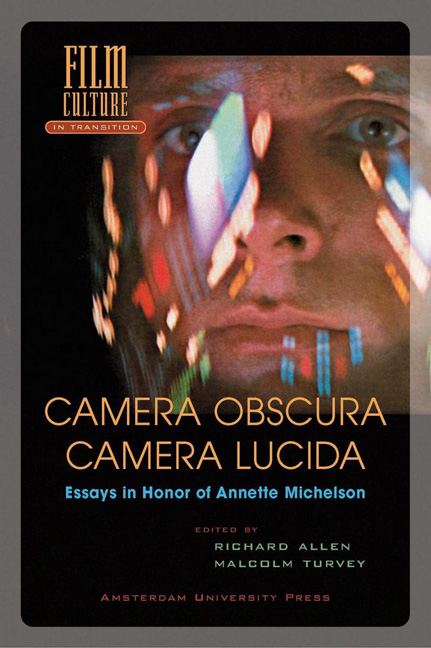Book contents
- Frontmatter
- Contents
- Acknowledgements
- Preface
- Introduction
- The Logic of an Illusion: Notes on the Genealogy of Intellectual Cinema
- Narcissistic Machines and Erotic Prostheses
- Loïe Fuller and the Art of Motion: Body, Light, Electricity and the Origins of Cinema
- Visitings of Awful Promise: The Cinema Seen from Etna
- Transfiguring the Urban Gray: László Moholy-Nagy’s Film Scenario ‘Dynamic of the Metropolis’
- Eisenstein’s Philosophy of Film
- Knight’s Moves
- Hitchcock and Narrative Suspense: Theory and Practice
- From the Air: A Genealogy of Antonioni’s Modernism
- Dr. Strangelove: or: the Apparatus of Nuclear Warfare
- Collection and Recollection: On Film Itineraries and Museum Walks
- Afterward: A Matter of Time: Analog Versus Digital, the Perennial Question of Shifting Technology and Its Implications for an Experimental Filmmaker’s Odyssey
- Select Bibliography
- List of Contributors
- Index
- Film Culture in Transition General Editor: Thomas Elsaesser
Eisenstein’s Philosophy of Film
Published online by Cambridge University Press: 25 January 2021
- Frontmatter
- Contents
- Acknowledgements
- Preface
- Introduction
- The Logic of an Illusion: Notes on the Genealogy of Intellectual Cinema
- Narcissistic Machines and Erotic Prostheses
- Loïe Fuller and the Art of Motion: Body, Light, Electricity and the Origins of Cinema
- Visitings of Awful Promise: The Cinema Seen from Etna
- Transfiguring the Urban Gray: László Moholy-Nagy’s Film Scenario ‘Dynamic of the Metropolis’
- Eisenstein’s Philosophy of Film
- Knight’s Moves
- Hitchcock and Narrative Suspense: Theory and Practice
- From the Air: A Genealogy of Antonioni’s Modernism
- Dr. Strangelove: or: the Apparatus of Nuclear Warfare
- Collection and Recollection: On Film Itineraries and Museum Walks
- Afterward: A Matter of Time: Analog Versus Digital, the Perennial Question of Shifting Technology and Its Implications for an Experimental Filmmaker’s Odyssey
- Select Bibliography
- List of Contributors
- Index
- Film Culture in Transition General Editor: Thomas Elsaesser
Summary
Introduction: The Problem
In an early essay, co-authored with Sergei Yutkevich, Sergei Eisenstein celebrates film as the eighth art. Eisenstein and Yutkevich imagine a gathering of the seven classical muses at a sort of board meeting, when suddenly Charlie Chaplin, representing cinema, bursts in and confidently takes a seat on the ‘Council of Muses.’ This, of course, is an allegory signaling the advent of a powerful new medium, and it expresses a common wish of silent filmmakers and theorists alike: that cinema be accorded the status of art. For it would only be through its recognition as an artform, they thought, that film could command the respect its advocates believed it deserved. Like so many of his contemporaries, Eisenstein was committed to demonstrating that film, or at least certain types of film, could be art. That conviction not only marks his earliest essays, but also preoccupies – even haunts – him throughout his career.
Though this early essay sounds a recurring theme in Eisenstein's writings – the theme of film as art – it is uncharacteristic in at least one respect. It simply asserts that film is art. Chaplin, as cinema, muscles his way into the circle of muses and insolently defies anyone to try to oust him. It is easy to interpret this allegory as saying that in virtue of self-evident masterpieces like Chaplin's there can be no question that film is an art form. It is an established fact, so to speak; it requires no further argumentation, once palpably artistic achievements like Chaplin's are available for all to see.
And this, of course, is probably how film really did become an acknowledged artform. The proof of the pudding was in the tasting. Nevertheless, throughout the first part of the twentieth century, the lovers of film thought more was necessary. It had to be proven that film was an art. And this became a major burden of film theory in general and of Eisenstein's theory of film in particular. Thus, from the brash assertion that film was an art, Eisenstein's subsequent career was obsessed with showing this to be the case.
As I have indicated, this was a frequent theme of early film theory.
- Type
- Chapter
- Information
- Camera Obscura, Camera LucidaEssays in Honor of Annette Michelson, pp. 127 - 146Publisher: Amsterdam University PressPrint publication year: 2003



